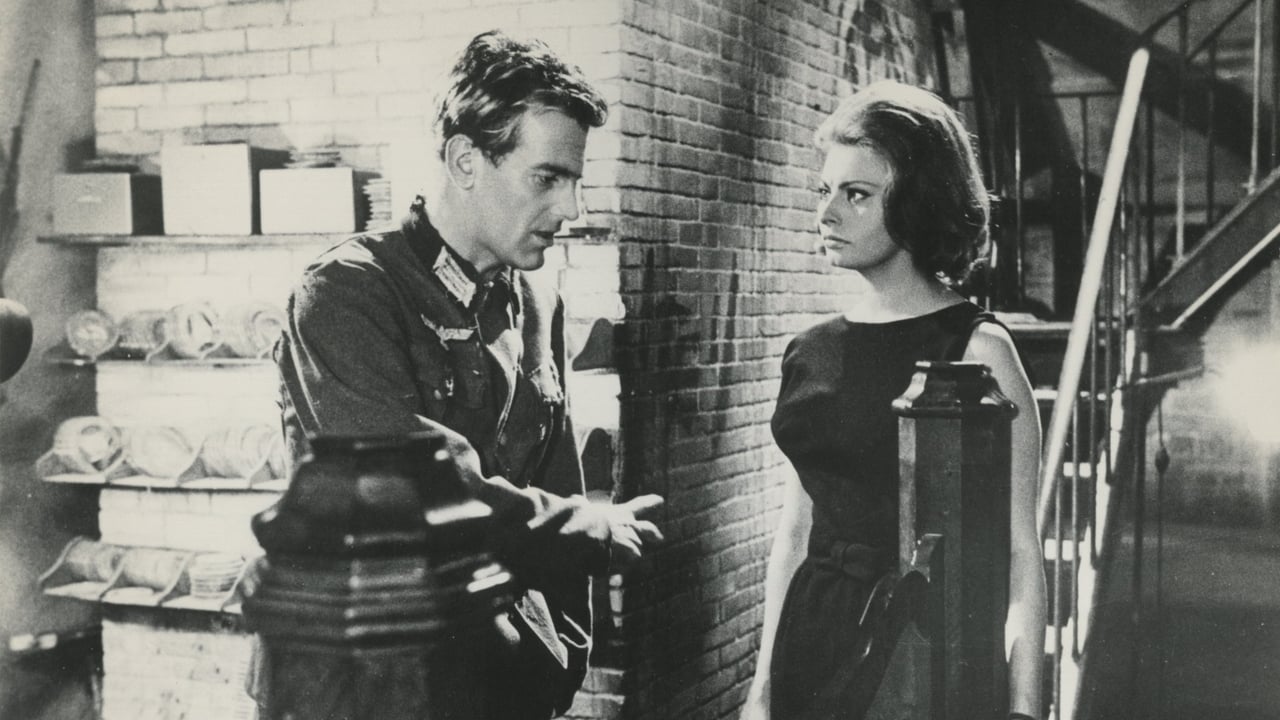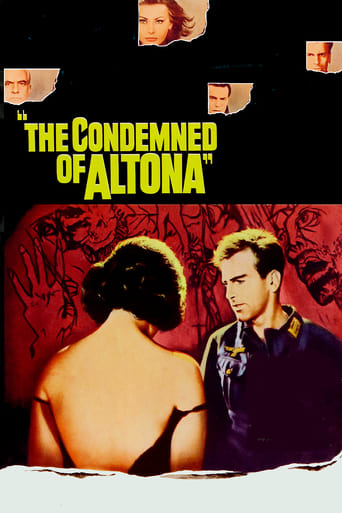

I like the storyline of this show,it attract me so much
... View MoreReally Surprised!
... View MoreThe movie is wonderful and true, an act of love in all its contradictions and complexity
... View MoreThe tone of this movie is interesting -- the stakes are both dramatic and high, but it's balanced with a lot of fun, tongue and cheek dialogue.
... View MorePerhaps because I saw this film dubbed in Italian with English subtitles and missed the familiar voices of Fredric March, Maximilian Schell, and Robert Wagner I was put off somewhat. But The Condemned Of Altona just did not rise to what I was expecting. Or maybe it was Jean-Paul Sartre's view of the world.Whatever it was his ideas just did not translate well to the big screen. Meet the family Gerlach, father Fredric March big German industrial tycoon and his children Maximilian Schell, Robert Wagner, and Francoise Prevost. Germany may have lost the war, but her natural resources and the need for an anti-Communist bulwark in the Cold War have made her richer than ever, if de-Nazified. March has been told he's terminally ill and has six months tops. He's troubled about his choices. The younger son Robert Wagner is not fit material for a tycoon and in the patriarchal society Francoise Prevost is out of the question.Then there's Maximilian Schell who has self secluded and deluded. He's a wanted war criminal from World War II and he's imposed an exile on himself. He believes because he knows no better that Germany is a vast rubble.Bringing him out of his exile is Wagner's new wife Sophia Loren who's been wondering about that locked section of that Gothic manor the Gerlachs have for themselves.As for the rest all I can say is Schell's guilt is the engine that drives the rest of the film. The best part of the film is something that could not be done on stage. Schell finally lose and seeing with his own eyes, the prosperity and the bustling night life that was Hamburg. Wonder if he went to the clubs and found some musicians from Liverpool who would shake the world soon?I did see this on stage at Lincoln Center a couple of years after the film had been made of Jean-Paul Sartre's play with George Coulouris heading the cast as the family patriarch. As he is often on screen, Coulouris was mesmerizing in self absorption and monomania about seeing his industrial complex carrying on. By contrast March seemed dull and lifeless and this has to rank as one of his lesser films. But not to single him out alone, the whole cast was the same way with the exception of Schell. But he's got the best part of a man who had to enlist in the army after his father got him off from protecting a Rabbi to a man who committed war atrocities on the Russian front.Sartre was saying that war itself can make people do evil things. And that the true guilty parties never saw any punishment, on the contrary like March they triumphed in defeat.In other words, what a world.
... View MoreI only saw this film once, nearly forty years ago, on television. I later read the original Sartre play in a drama class, and found that the movie was reasonably faithful to the original. It is apparently unavailable on home video, unfortunately.I remember being fascinated by the compelling performance of Maximilian Schell as the former Nazi officer who is believed dead, but actually hiding out in his family's attic. His sister, for some reason ,lets him think the war is still going on, twenty years later. She reads him made-up news bulletins about the Allies' destruction of Germany, feeding his madness.The most memorable scene was when the recluse Schell left the house, and went out into the city for the first time in twenty years or more. People stare and laugh at him, as he walks around the modern city in his old Nazi uniform. He is bewildered by all the modern buildings and signs of prosperity in a Germany he had believed utterly destroyed forever.In a particularly clever touch, he somehow ends up in a theater, where a Nazi era satire is being performed. The modern German audience laughs at the caricatured Hitler and his followers. As a kid, I realized it was some kind of Hitler spoof, but the whole thing was in German, and I had to guess at its significance. I now believe that it was most likely a play within a play, namely a scene from the climax of Bertolt Brecht's The Resistible Rise of Arturo Ui. It's been a long time since I saw this film, but it seems to me that Schell, in his madness and confusion, mistakenly believes it's some kind of real Nazi rally, and starts saluting "Hitler" , while the audience thinks he's part of the show. It's unfortunate that this movie isn't available for a new audience to appreciate. With any luck, it will come to home video eventually.
... View MoreThis is a darkly disturbing film of a Nazi war criminal, still wearing his German army uniform, who is hidden in his father's house, and led to believe that World War II is still going on. The ending of the movie is a bizarre mix of Fellini and Capote. Schell escapes his "prison" and walks around the streets only to be "shocked" that there is no destruction or war raging. He ends up in a local theater and salutes an actor playing Hitler. I won't give the ending away, but it's a shocking surprise ala Play Dirty or To Live and Die in LA. The acting is great, the black and white film make the movie realistic and it captures a time in history which hopefully is gone for ever. An excellent film.
... View MoreIt was very long ago, but this film touched me deeply. A became obsessed with Shostakovich's 11th Symphony, and remember vividly some scenes. When Maximillian Schell is finally "released" and goes out into the city (Hamburg?) to see what Germany has become, he is repulsed. When Frederich March is told he will die, he is solemn. The plot, that they have hidden their son because he is a wanted war criminal. That they collaborated willingly with the Nazis, as an industrial power. Perhaps I have forgotten important details. But the movie resonates with me.
... View More